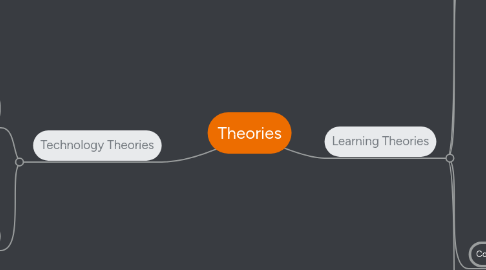
1. Technology Theories
1.1. SCOT (Social Construction of Technology)
1.1.1. Technology does not influence human action; human action shapes technology
1.1.2. Human use and interaction with technology determine a technology's use: not the technology's actual competence.
1.1.2.1. Allows for an understanding of technological success.
1.1.3. Social interaction with technology ultimately determines new technology success.
1.1.3.1. Popular with social world: Success
1.1.3.2. Not popular with social world: Failure
1.2. Media Technology
1.2.1. "Study of media as an environment"
1.2.1.1. No defined definition
1.2.2. Technology influences society; determines current view of world
1.2.2.1. Opposes idea of SCOT
2. Learning Theories
2.1. Behaviorism
2.1.1. The mind is a black box, learning occurs via observation and absorption of direct information.
2.1.2. Learning occurs via a stimulus and a response.
2.1.2.1. Reward response: promotes response hard wires positive experience/information to memory
2.1.2.2. Punishment response: disapproves response hard wires negative experience, discourages information from memory
2.1.3. Revolves around task based learning
2.1.3.1. Practice worksheets
2.1.3.2. Lectures
2.2. Cognitive Load
2.2.1. The mind is not a black box; the mind stores information for future use.
2.2.2. Learning is influenced by existing schema/past experiences.
2.2.2.1. Pre-existing schema altered via scaffolding and teachers.
2.2.3. Memory acts as a bank of information
2.2.3.1. Memory can be stored (deposited)
2.2.3.2. Memory can be retrieved (withdrawn)
2.2.4. Reason based thinking strategies to encourage learning
2.2.4.1. Problem solving
2.2.4.2. Critical thinking
2.3. Constructivism
2.3.1. Everyone's pre-existing schema/personal knowledge is unique, therefore learning is unique and personal to each individual.
2.3.2. Encourages social interaction between student-teacher and student-peer.
2.3.3. Influences on effective learning:
2.3.3.1. Motivation and engagement
2.3.3.2. Social ability
2.3.3.3. Culture
2.3.4. The primary method of teaching occurs during social interaction: identifying student needs based on each student individual
2.3.5. Learning strategies include:
2.3.5.1. Real world learning application to entice motivation
2.3.5.2. Group work to encourage cognitive social development
2.3.5.3. The creation of opportunities to identify cultural differences and in turn create further social development
2.4. Connectivism
2.4.1. Knowledge found on social networks, network sources, etc.; distribution of a wide variety of sources to share information
2.4.2. Patterns found on multiple sources reinforces knowledge: hence memory is affected. (Akin to behaviorism?)
2.4.3. Knowledge and information is always changing; allows for a connection to this changing information: hence allows for ability to adapt to constant change in information
2.4.4. Teacher facilitates classroom by presenting network opportunities, providing "tech support" where necessary, and additional learning support if connecting "falls through".
2.4.4.1. Teacher acts as a, nearly, pure guide
